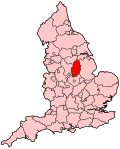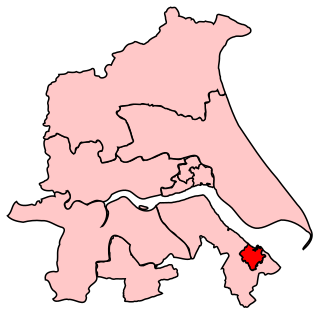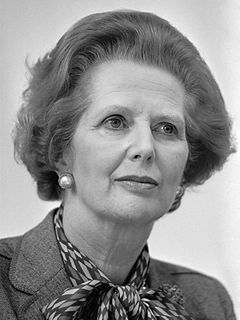| Ashfield constituency | |
|---|---|
  | |
| Ashfield shown within Nottinghamshire, and Nottinghamshire shown within England | |
The Ashfield by-election was held on 28 April 1977 in the Ashfield constituency in the coal mining area of Nottinghamshire, following the resignation of Labour Member of Parliament David Marquand. Conservative candidate Tim Smith was the narrow winner in what was thought to have been a very safe Labour seat.
By-elections, also spelled bye-elections, are used to fill elected offices that have become vacant between general elections.

Ashfield is a Nottinghamshire constituency represented in the House of Commons of the UK Parliament since 2010 by Gloria De Piero of the Labour Party.

Coal mining is the process of extracting coal from the ground. Coal is valued for its energy content, and, since the 1880s, has been widely used to generate electricity. Steel and cement industries use coal as a fuel for extraction of iron from iron ore and for cement production. In the United Kingdom and South Africa, a coal mine and its structures are a colliery, a coal mine a pit, and the above-ground structures the pit head. In Australia, "colliery" generally refers to an underground coal mine. In the United States, "colliery" has been used to describe a coal mine operation but nowadays the word is not commonly used.
Marquand had resigned to take up a post at the European Commission in Brussels, as an advisor to the United Kingdom's newly appointed Commissioner Roy Jenkins. His majority at the October 1974 general election had been 22,915, [1] which made the seat look very safe.

The European Commission (EC) is an institution of the European Union, responsible for proposing legislation, implementing decisions, upholding the EU treaties and managing the day-to-day business of the EU. Commissioners swear an oath at the European Court of Justice in Luxembourg City, pledging to respect the treaties and to be completely independent in carrying out their duties during their mandate. Unlike in the Council of the European Union, where members are directly and indirectly elected, and the European Parliament, where members are directly elected, the Commissioners are proposed by the Council of the European Union, on the basis of suggestions made by the national governments, and then appointed by the European Council after the approval of the European Parliament.

Brussels, officially the Brussels-Capital Region, is a region of Belgium comprising 19 municipalities, including the City of Brussels, which is the capital of Belgium. The Brussels-Capital Region is located in the central portion of the country and is a part of both the French Community of Belgium and the Flemish Community, but is separate from the Flemish Region and the Walloon Region. Brussels is the most densely populated and the richest region in Belgium in terms of GDP per capita. It covers 161 km2 (62 sq mi), a relatively small area compared to the two other regions, and has a population of 1.2 million. The metropolitan area of Brussels counts over 2.1 million people, which makes it the largest in Belgium. It is also part of a large conurbation extending towards Ghent, Antwerp, Leuven and Walloon Brabant, home to over 5 million people.

The United Kingdom, officially the United Kingdom of Great Britain and Northern Ireland but more commonly known as the UK or Britain, is a sovereign country lying off the north-western coast of the European mainland. The United Kingdom includes the island of Great Britain, the north-eastern part of the island of Ireland and many smaller islands. Northern Ireland is the only part of the United Kingdom that shares a land border with another sovereign state—the Republic of Ireland. Apart from this land border, the United Kingdom is surrounded by the Atlantic Ocean, with the North Sea to the east, the English Channel to the south and the Celtic Sea to the south-west, giving it the 12th-longest coastline in the world. The Irish Sea lies between Great Britain and Ireland. With an area of 242,500 square kilometres (93,600 sq mi), the United Kingdom is the 78th-largest sovereign state in the world. It is also the 22nd-most populous country, with an estimated 66.0 million inhabitants in 2017.
There was another by-election held on the same day, in Tony Crosland's nearby former seat of Grimsby which looked much more marginal. Crosland had died on 19 February 1977. The Labour Party directed most of its campaign effort into saving Grimsby, believing Ashfield was in no danger. This strategy succeeded in saving Grimsby, but allowed Tim Smith to win by 264 votes [2] (after a recount) over Labour's Michael Cowan.

Great Grimsby is a constituency in North East Lincolnshire represented in the House of Commons of the Parliament of the United Kingdom since May 2015 by Melanie Onn of the Labour Party.
Smith was unable to hold the seat at the 1979 general election, when Labour's Frank Haynes won with a majority of 7,797.
David Francis Haynes was a British politician. A member of the Labour Party, he served at the Member of Parliament (MP) for Ashfield from 1979-92.










